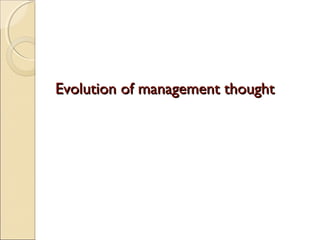
Evolution of Management Thought
- 1. Evolution of management thoughtEvolution of management thought
- 2. Early approaches to ManagementEarly approaches to Management The Industrial Revolution, which began in Europe in the mid-1700s, was the starting point for the development of management concepts and theories.
- 3. Classical ApproachClassical Approach Classical management can be divided into three separate schools:- Scientific management – F.W. Taylor Administrative theory – Henry Fayol Bureaucratic management – Max Weber
- 4. Overview of classical theoriesOverview of classical theories Approach Rationale Focus Scientific management One best way to do each job Job level Administrative principles One best way to put an organization together Organizati onal level Bureaucratic organization Rational and impersonal organizational arrangements Organizati onal level
- 5. Classical ApproachClassical Approach These views are labeled as classical because they form the foundation for the field of management thought.
- 6. Scientific managementScientific management It is an approach that emphasizes the scientific study of work methods to improve the efficiency of workers. It became popular in 1900s.
- 7. Scientific managementScientific management F.W. Taylor was known as the ‘father of scientific management.’ Midvale Steel Co. Soldiering To counter the soldiering problem Taylor developed the science of Management.
- 8. Scientific managementScientific management Steps Description Step 1 Develop a science for each element of the job Step 2 Scientifically select employees and then train them Step 3 Supervise the employees Step 4 Continue to plan but get the work done by the workers
- 9. Scientific managementScientific management The two major managerial practices that emerged from Taylor’s approach :- Piece-rate incentive system Time-and-motion study
- 10. Limitations of scientific managementLimitations of scientific management Scientific management focus on problems at operational level. People are motivated only by material gains. It ignored human desire for job satisfaction.
- 11. Administrative TheoryAdministrative Theory It focused on principles that could be used by managers to coordinate internal activities of organization. Henry Fayol – French According to Fayol, the business operations of an organization could be divided into 6 activities
- 12. Administrative TheoryAdministrative Theory The 6 activities are :- Technical Commercial Financial Security Accounting Managerial
- 13. Fayol’s 14 principles of ManagementFayol’s 14 principles of Management Division of work Authority and responsibility Discipline Unity of command Unity of direction Subordination of the individual interest to the general interest.
- 14. Fayol’s 14 principles of ManagementFayol’s 14 principles of Management Remuneration Centralization Scalar chain Order Equity Stability of tenure of personnel Initiative Espirit de corps
- 15. Bureaucratic ManagementBureaucratic Management Max Weber Major characteristics of Bureaucracy Work specialisation and division of labour Rules and regulations Impersonality Hierarchy of organization
- 16. Limitations of bureaucratic andLimitations of bureaucratic and administrative managementadministrative management Not universally accepted principles. Bureaucracy destroyed individual creativity and flexibility. Important aspects of O.B. was ignored. External and internal environment ignored.
- 17. Behavioral ApproachBehavioral Approach The behavioural school of management emphasized what the classical theorists ignores – The human element.
- 18. Elton Mayo : Focusing on HumanElton Mayo : Focusing on Human RelationsRelations Father of the Human Relations Approach Western Electric’s Hawthorne Plant
- 19. Elton Mayo : Focusing on HumanElton Mayo : Focusing on Human RelationsRelations The experiments were conducted in four phases: Illumination experiment Relay assembly test room experiment Interview phase Bank wiring observation room experiment
- 20. Contributions of Hawthorne studiesContributions of Hawthorne studies The group is the key factor in job performance Perceived meaning and importance of the work determine output Workplace culture sets its own production standards
- 21. Criticism of Hawthorne studiesCriticism of Hawthorne studies Critics felt that the conclusions were supported by little evidence. The relationship made between satisfaction of workers and productivity was too simple. The studies failed to focus on the atitudes if employees.
- 22. Abraham Maslow : Hierarchy of needsAbraham Maslow : Hierarchy of needs People are motivated by a hierarchy of needs His theory had three assumptions All of us have needs which are never fulfilled Through our actions we try to fulfill our unsatisfied needs Needs can be classified into 5 types
- 24. Abraham Maslow : Hierarchy of needsAbraham Maslow : Hierarchy of needs According to Maslow, once needs at a specific level have been satisfied, they no longer act as motivators of behaviour. Then individual strives to fulfill needs at the next level.
- 25. Douglas McGregor : Theory X andDouglas McGregor : Theory X and Theory YTheory Y These theories reflect two extreme sets of belief that different managers have about their workers. Theory X represents an essentially negative view. Theory Y reflects a more positive view.
- 26. Chris Argris : Matching human andChris Argris : Matching human and organizational developmentorganizational development Maturity –immaturity theory Model I and Model II Model I – Employees are manipulative and not willing to take risks
- 27. Quantitative approachQuantitative approach 1. Management science Another name for it is operations research 2. Operations management 3. Management information systems
- 28. Modern approaches to managementModern approaches to management 1. Systems approach Organizations cannot exist in isolation Four major components – Inputs, transformation process, output and feedback Open and closed systems
- 29. Modern approaches to managementModern approaches to management 2. Contingency theory Situational theory
- 30. Emerging Approaches in ManagementEmerging Approaches in Management ThoughtsThoughts William Ouchi – theory Z Conducted research on both American and Japanese management approaches Theory Z involves providing job security to employees to ensure their loyalty Quality management